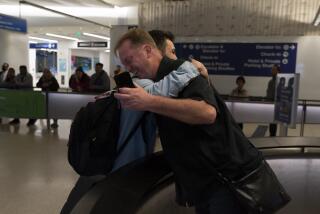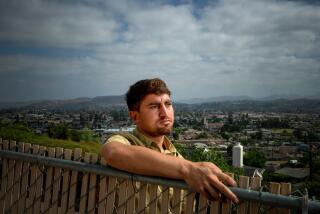Ex-CIA Official Testifies for Kurd Suspected of Being Double Agent
- Share via
In a case that has attracted national attention, a former high-ranking CIA officer testified Thursday on behalf of a Kurdish doctor who says he once fought against Iraqi dictator Saddam Hussein but now faces deportation from the United States over concerns he is a double agent.
Dr. Ali Yasim Mohammad Karim is the last of a group of six Kurds who have been contesting their return to Iraq after the United States evacuated them from the country in March 1997. They have been in U.S. custody ever since.
Their plight has raised serious questions about the use of secret evidence and uncorroborated information in government efforts to deport people suspected of being national security risks.
Karim’s fight to stay in the country also has attracted attention because former CIA director R. James Woolsey, now a Washington lawyer, is a member of his defense team. Woolsey has described the government’s case as “ridiculous.”
Immigration proceedings to determine whether Karim is a risk to national security began Monday in U.S. Immigration Court on Terminal Island. If the government loses, the general practitioner will be eligible to apply for political asylum.
Warren J. Marik, a retired CIA case officer once assigned to Iraq, testified Thursday that Karim was not a danger to the United States and that he’s done nothing to suggest he operated as a spy for Iran or Iraq.
Marik, who knew Karim and other members of Kurdish resistance groups, warned that if the doctor were returned to Iraq he eventually would be tortured and killed by Hussein’s henchmen.
“There was nothing to bring any suspicion on Ali,” Marik said. “He never asked for information. He never cased anything. He never tried to suborn the guards. . . . There’s no smoking gun.”
Marik’s testimony conflicts with the position of the Immigration and Naturalization Service, which contends there are reasonable grounds to suspect that Karim is linked to Iranian or Iraqi intelligence operations.
Government attorneys contend that Karim repeatedly traveled in Iran, that his organization had contact with Iranian intelligence officers, and that he might have misled FBI agents about how a relative was evacuated by the U.S.
Outside court Thursday, Woolsey called the allegations “nonsense.” He said the combination of secret evidence and the government’s “loose” standard for determining national security risks has conspired to produce a grave injustice for Karim.
In 1998, the judge in the case, D.D. Sitgraves, determined that Karim and the other Kurds were threats to the nation after considering classified information that cannot, under federal law, be provided to defense lawyers.
In June, five of the Kurds decided not to appeal the decision and agreed to be deported to a democratic country of their choice. They are being held under INS house arrest in Lincoln, Neb., while arrangements are made for their departure.
But Karim decided to contest the ruling. Woolsey said that the government had charged his client using secret documents, but that it released about 90% of the information after the defense team began making inquiries.
Woolsey said the government gave no explanation for the release of the documents, which he contends reveals the inadequacies of the case against Karim.
“The man’s a physician. A nice Kurdish doctor,” the former CIA director said. “He is not the kind of individual agents seek to recruit.”
In court, Marik, a 25-year veteran of the CIA who now runs a nonprofit think tank on Iraq, testified that he led three missions to Iraq in 1994 and 1995 to work with Kurdish organizations, including the U.S.-backed Iraqi National Congress to which Karim belonged.
He said he had daily meetings with members of the national congress and repeated contacts with Karim, both socially and for minor medical care. Marik testified that the leadership as well as other members of the group vouched for the doctor.
Members of the organization had contact with Iranian intelligence officers, he said, but it was in the open and not opposed by the U.S. government.
Marik dismissed the government’s concerns about Karim’s travel to Iran, saying it was common for Kurds to do so because their relatives lived there and the country was a haven for them.
The former CIA officer also disputed the reliability of the government’s information against Karim. That information was gathered by FBI interviews in Guam, where hundreds of Kurdish evacuees were initially sent as Hussein attacked their forces in northern Iraq in 1997.
Marik said the sources may have been members of competing political factions, had reason to lie about Karim, or were passing on rumor or innuendo to FBI agents.
Under questioning by INS Deputy Dist. Counsel Robert Bryant, Marik said he did not know about Karim’s history, including work in an Iraqi missile plant, a military facility. But he said that was not concerned because many people in Iraq end up working for the government.
More to Read
Sign up for Essential California
The most important California stories and recommendations in your inbox every morning.
You may occasionally receive promotional content from the Los Angeles Times.














